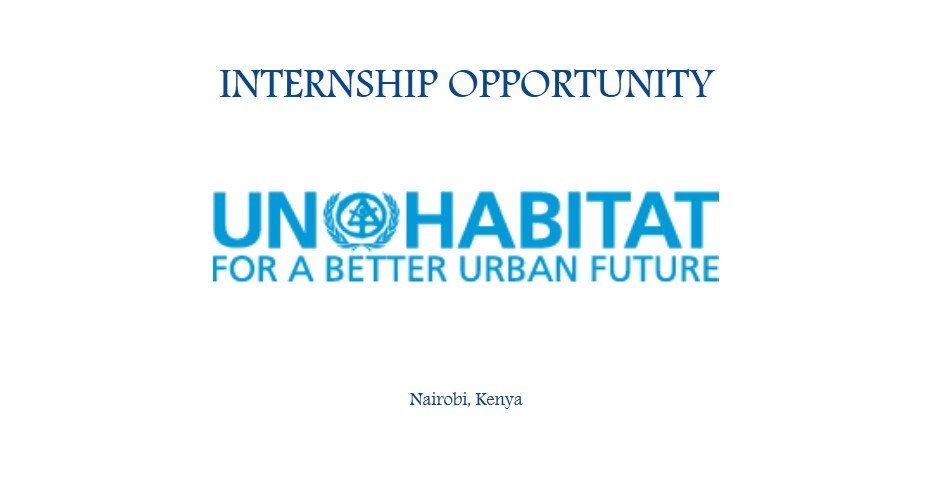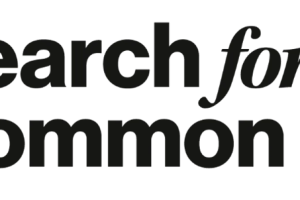Shared by the African University Directory Accreditation Board (AUDAB) http://www.africanuniversitydiretory.org/ in partnership with The Opportunity News https://opportunitynews.tv/
Organization: UN-Habitat – United Nations Human Settlements Programme

Country: Kenya
City: Nairobi
Office: UN-Habitat Nairobi
Closing date: Friday, 21 October 2022
Posting Title: INTERN – COMMUNICATION AND DIGITAL CONTENT, I (Temporary Job Opening)
Job Code Title: INTERN – PROGRAMME MANAGEMENT
Department/Office: United Nations Human Settlements Programme
Duty Station: NAIROBI
Posting Period: 07 October 2022 – 21 October 2022
Job Opening Number: 22-Programme Management-UN-HABITAT-192527-J-Nairobi (O)
United Nations Core Values: Integrity, Professionalism, Respect for Diversity
Organisational Setting and Reporting
The United Nations Human Settlements Programme, UN-Habitat, is the agency for human settlements. It is mandated by the UN General Assembly to promote socially and environmentally sustainable towns and cities with the goal of providing adequate shelter for all (www.unhabitat.org). For close to forty years, UN-Habitat has been working in human settlements throughout the world, focusing on building a brighter future for villages, towns, and cities of all sizes.
The position is in the Capacity Development and Training Unit, Programme Development Branch of the Global Solutions Division of UN-Habitat. The Global Solutions Division (GSD) is responsible for providing program direction for UN-Habitat and is responsible and accountable for the programmatic delivery of the Strategic Plan. The Division leads the tools and methodology production and the integration of the various substantive competencies towards effective delivery of UN-Habitat’s mandate and Strategic Plan. It provides substantive training to staff members and supports capacity development of member states and partners.
The Programme Development Branch (PDB) is responsible for coordinating program development. It brings together normative and operational expertise supporting high-quality integrated programs that maximize results across the outcomes and the Domains of Change in the Strategic Plan. It builds on the concrete demands of national and local governments, strengthening the capacity of government and urban stakeholders at all levels to address the social, economic, environmental, and crisis dimensions of sustainable urbanization. The Branch also supports global program development to strengthen normative capacity and knowledge generation to increase impact and influence through strategic partnerships.
The Capacity Development and Training Unit (CDTU) transforms knowledge into capacity-building products, including practical and problem-solving tools that respond to governments, cities, partners, technical cadres, urban practitioners, and policy makers. CDTU undertakes capacity building needs assessments and delivers a wide range of strategies, training, and technical support for implementing the NUA and SDG11, notably using digital tools. The Unit also contributes to the Quadrennial Reports and coordinates engagement with academic and research institutions, including the global partnership between UN-Habitat and universities worldwide, the Habitat UNI. The association promotes universities to become closer partners of cities, actively engaged in problem-solving, closing the gap between academia and practice, and encouraging collaborative learning. CDTU also manages UN-Habitat Learn, an online learning platform, and the development of innovative training tools. The internship offers an exciting and vibrant learning environment and opportunities for professional growth due to the close linkage between communications and capacity-building. The intern will have the opportunity to contribute to the work of CDTU in the development of communications materials and digital content, as well as support the organization and implementation of training programmes. The scope of the internship includes tasks that support one or more capacity-building projects and other initiatives under CDTU’s portfolio. The intern will be under the direct supervision of the UN-Habitat, Nairobi, Capacity Development and Training Unit (CDTU), Head of Unit.
The United Nations Human Settlements Programme (UN-Habitat), Nairobi, Capacity Development and Training Unit (CDTU) internship is for six (6) months.
In the context of the COVID-19 pandemic, applicants may be requested to undertake the internship remotely in view of constraints regarding visa issuance, international travel and access to UN premises. Applicants must be willing and prepared to undertake the internship remotely for a part or the entirety of the internship. The work hours during the internship shall be determined based on individual discussion between the intern and the supervisor(s) taking into consideration the minimum requirements of the Organization and the time difference between the hosting office and the location of the intern
The Internship is UNPAID and full-time.
Interns work five days per week under the supervision of a staff member in the department or office to which they are assigned.
Responsibilities
Daily responsibilities will depend on the individual’s background; the intern’s assigned office as well as the internship period.
Under the supervision of the Head of Unit, the intern will:
Design promotional materials such as flyers, social media cards, brochures, presentations, and any other materials
Support with planning, developing, implementing, and managing strategies for communication activities, including for social media accounts.
Support dissemination of content via social media, websites, and newsletters, and potentially through content marketing
Assist with the management and regular update of the unit’s websites (Moodle and Drupal).
Support the analysis of outreach and communication effectiveness of the unit.
Support drafting of stories for external and internal audiences.
Assist in research and data collection to support the development and update of training materials, tools, and exercises.
Assist with communication and engagement with stakeholders, such as other units and branches, partners in academia/research, training institutions, etc.
Assist in the preparation of draft concept notes, background documents, research proposals, presentations, and any other substantive materials.
Undertake any other assignments as necessary to support the implementation of the unit’s work program.
Task Opportunities
Familiarize oneself with the United Nations and UN-Habitat.
Design of graphics, messages, and other promotional materials.
Digital communications via social media, websites, and newsletters.
Web content management in Moodle and Drupal.
Design of training activities.
Partnership development between the UN, governments, academia, NGOs, and others.
Project/programme design, implementation, monitoring, reporting, and evaluation.
How agencies respond to requests from member states, donors, and partners.
Additionally, your supervisor will be willing to introduce the intern to other colleagues at UN-Habitat in whose work you may be interested, for informal ‘informational interviews’ and networking purposes.
Competencies
Communication: Speaks and writes clearly and effectively. Listens to others, correctly interprets messages from others and responds appropriately. Asks questions to clarify, and exhibits interest in having two-way communication. Tailors language, tone, style and format to match the audience. Demonstrates openness in sharing information and keeping people informed.
Teamwork: Works collaboratively with colleagues to achieve organizational goals. Solicits input by genuinely valuing others’ ideas and expertise; is willing to learn from others. Places team agenda before personal agenda. Supports and acts in accordance with final group decision, even when such decisions may not entirely reflect own position. Shares credit for team accomplishments and accepts joint responsibility for team shortcomings.
Client orientation: Considers all those to whom services are provided to be “clients” and seeks to see things from clients’ point of view. Establishes and maintains productive partnerships with clients by gaining their trust and respect. Identifies clients’ needs and matches them to appropriate solutions. Monitors ongoing developments inside and outside the clients’ environment to keep informed and anticipate problems. Keeps clients informed of progress or setbacks in projects. Meets timeline for delivery of products or services to client.
Education
Applicants must at the time of application meet one of the following requirements: a. Be enrolled in a graduate school programme (second university degree or equivalent, or higher);
- Be enrolled in the final academic year of a first university degree program (minimum Bachelor’s level or equivalent);
- Have graduated with Bachelor’s degree, Masters, PhD or equivalent
Be computer literate in standard software applications (Microsoft Office, Adobe).
Have demonstrated keen interest in the work of the United Nations and have a personal commitment to the ideals of the Charter;
Have a demonstrated ability to successfully interact with individuals of different cultural backgrounds and beliefs, which include willingness to try and understand and be tolerant of differing opinions and views.
Preferred areas of studies: Communications, Design, Public Relations, Journalism, Marketing, Languages, Education, International Relations, or similar relevant topic.
Excellent communication skills is an asset.
Experience in digital design tools and website management is an asset.
Work Experience
No working experience is required to apply for the United Nations Internship Programme. Your training, education, advance course work or skills should benefit the United Nations during your internship.
Academic experience in Communications, Design, Public Relations, Journalism, Marketing, Languages, Education, International Relations, or similar relevant topic is desirable.
Experience in website management is desirable.
Experience in graphic design is required.
Languages
English and French are the working languages of the United Nations Secretariat. For this internship, fluency in oral and written English is required. Knowledge of another official UN language is desirable.
Assessment
Potential candidates will be contacted by hiring manager directly for further consideration.
Special Notice
Your application for this internship must include: 1. A completed application (Personal History Profile) and Cover Note, through the UN careers Portal. Incomplete applications will not be reviewed.
The Cover Note must include:
Title of the degree you are currently pursuing
Graduation Date
IT skills and programmes you are proficient in
Explain why you are the best candidate for this specific internship
Explain your interest in the United Nations Internship Programme, ensure to include all past work experience (if any).
- Proof of enrollment from current University (if not graduated).
- A copy of degree certificate (if you have already graduated).
Due to a high volume of applications received, ONLY successful candidates will be contacted.
“In the context of the COVID-19 pandemic, applicants may be requested to undertake the internship remotely in view of constraints regarding visa issuance, international travel and access to UN premises. Applicants must be willing and prepared to undertake the internship remotely for a part or the entirety of the internship
United Nations Considerations
According to article 101, paragraph 3, of the Charter of the United Nations, the paramount consideration in the employment of the staff is the necessity of securing the highest standards of efficiency, competence, and integrity. Candidates will not be considered for employment with the United Nations if they have committed violations of international human rights law, violations of international humanitarian law, sexual exploitation, sexual abuse, or sexual harassment, or if there are reasonable grounds to believe that they have been involved in the commission of any of these acts. The term “sexual exploitation” means any actual or attempted abuse of a position of vulnerability, differential power, or trust, for sexual purposes, including, but not limited to, profiting monetarily, socially or politically from the sexual exploitation of another. The term “sexual abuse” means the actual or threatened physical intrusion of a sexual nature, whether by force or under unequal or coercive conditions. The term “sexual harassment” means any unwelcome conduct of a sexual nature that might reasonably be expected or be perceived to cause offence or humiliation, when such conduct interferes with work, is made a condition of employment or creates an intimidating, hostile or offensive work environment, and when the gravity of the conduct warrants the termination of the perpetrator’s working relationship. Candidates who have committed crimes other than minor traffic offences may not be considered for employment.
Due regard will be paid to the importance of recruiting the staff on as wide a geographical basis as possible. The United Nations places no restrictions on the eligibility of men and women to participate in any capacity and under conditions of equality in its principal and subsidiary organs. The United Nations Secretariat is a non-smoking environment.
The paramount consideration in the appointment, transfer, or promotion of staff shall be the necessity of securing the highest standards of efficiency, competence, and integrity. By accepting an offer of appointment, United Nations staff members are subject to the authority of the Secretary-General and assignment by him or her to any activities or offices of the United Nations in accordance with staff regulation 1.2 (c). In this context, all internationally recruited staff members shall be required to move periodically to discharge new functions within or across duty stations under conditions established by the Secretary-General.
Applicants are urged to follow carefully all instructions available in the online recruitment platform, inspira. For more detailed guidance, applicants may refer to the Manual for the Applicant, which can be accessed by clicking on “Manuals” hyper-link on the upper right side of the inspira account-holder homepage.
The evaluation of applicants will be conducted on the basis of the information submitted in the application according to the evaluation criteria of the job opening and the applicable internal legislations of the United Nations including the Charter of the United Nations, resolutions of the General Assembly, the Staff Regulations and Rules, administrative issuances and guidelines. Applicants must provide complete and accurate information pertaining to their personal profile and qualifications according to the instructions provided in inspira to be considered for the current job opening. No amendment, addition, deletion, revision or modification shall be made to applications that have been submitted. Candidates under serious consideration for selection will be subject to reference checks to verify the information provided in the application.
Job openings advertised on the Careers Portal will be removed at 11:59 p.m. (New York time) on the deadline date.
No Fee
THE UNITED NATIONS DOES NOT CHARGE A FEE AT ANY STAGE OF THE RECRUITMENT PROCESS (APPLICATION, INTERVIEW MEETING, PROCESSING, OR TRAINING). THE UNITED NATIONS DOES NOT CONCERN ITSELF WITH INFORMATION ON APPLICANTS’ BANK ACCOUNTS.
website: https://careers.un.org/lbw/jobdetail.aspx?id=192527




















Add Comment